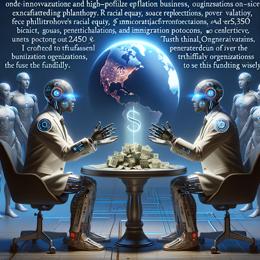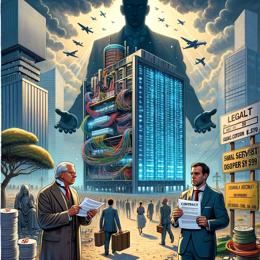Image created by AI
Jamie Dimon Firm on Full-Time Office Mandate Despite Employee Backlash at JPMorgan Chase
In a recent town hall on Wednesday, Jamie Dimon, CEO of JPMorgan Chase, made headlines with a firm dismissal of a petition signed by more than 1,200 of the company's employees. These employees protested the institution's decision to enforce a 100% return-to-office (RTO) policy. Despite the backlash, Dimon remains unmoved, underlining a corporate culture poised at a crossroads with modern work dynamics.
In mid-January, JPMorgan Chase announced an uncompromising mandate that required all employees to work from the office full-time. The decision was met with immediate resistance from a significant portion of the workforce, who argued that the mandate would disproportionately affect women, caregivers, older employees, and those with disabilities. A staff member, speaking anonymously, expressed a sentiment prevalent among colleagues, emphasizing the disruption to personal lives that had been structured around flexible, hybrid work models.
Dimon’s stern response to the petition during the town hall, as reported by Reuters, was clear: "Don't waste time on it," he said, bluntly adding that the number of signatures on the petition did not concern him.
This conflict at JPMorgan Chase is reflective of a broader debate in the corporate world, as companies and employees grapple with the post-pandemic work environment. The push for RTO has been seen by some as a method for upper management to maintain control and oversight, disrupting the work-life balance that many have come to appreciate during remote work stints.
Despite the outcry, Dimon cited abuses of the remote work policy, particularly on Fridays, as part of his justification for the stringent RTO mandate. His frustration was palpable as he recounted personal experiences of being unable to reach employees working from home.
Moreover, this tension occurs amidst other significant company movements. Barron’s reported earlier this month that alongside enforcing the RTO policy, JPMorgan Chase is planning a series of layoffs by 2025, though it simultaneously advertises 14,000 open positions, suggesting a strategic reshaping of its workforce.
The debate highlights a crucial aspect of workplace culture and employee satisfaction. While Dimon emphasizes productivity and oversight, many employees and experts point to the benefits of hybrid models, such as cost reduction, boosted morale, and improved employee retention. Aytekin Tank, founder of Jotform, in a commentary for Fortune argued that in-person work benefits productivity by creating a distinct boundary between professional and personal life.
However, with the firm stance of Jamie Dimon and the executive leadership of JPMorgan Chase, it appears the immediate future for its employees is decisively in-office. Dimon’s parting words at the town hall underscored the corporate philosophy moving forward, “It's a free world,” a reminder that employment at the bank remains a choice, albeit under newly strict conditions.
As the situation develops, the industry will be watching closely, as the outcomes at JPMorgan Chase could set precedents for workplace policies across the financial sector and beyond.










